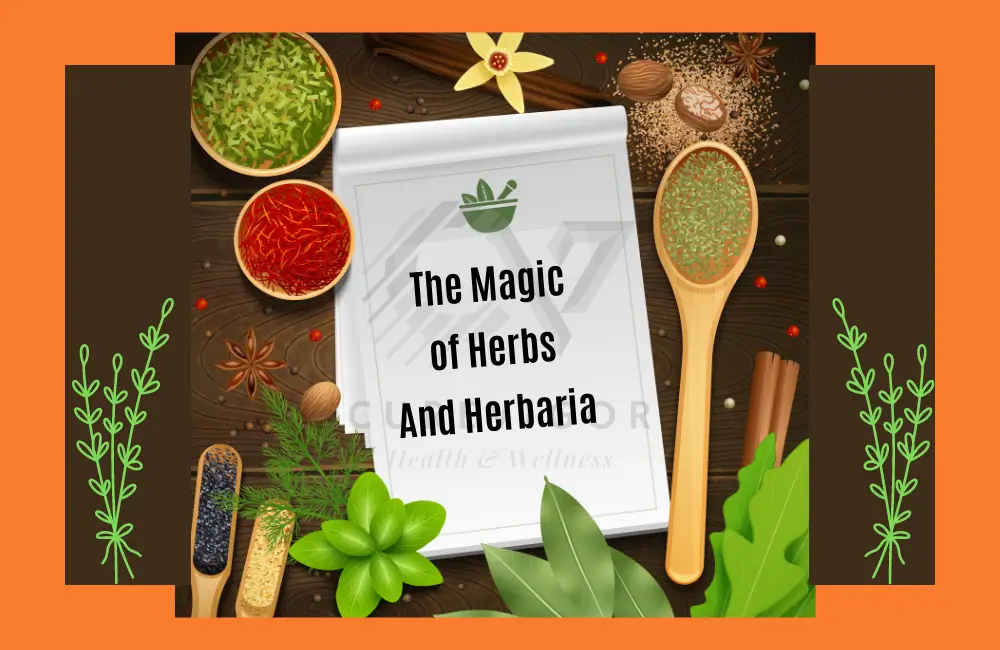Embark on a journey to natural healing! Unveil the magic of herbs and discover the power of natural remedies. Embrace a healthier lifestyle today! ✨
Contents
- 1 Unveiling the Magic of Herbs and Herbaria
- 1.1 Introduction
- 1.2 Understanding Herbs
- 1.3 The Science Behind Herbal Medicine
- 1.4 Creating Your Own Herb Garden
- 1.5 Herbal Harvesting and Preservation
- 1.6 Making Herbal Remedies at Home
- 1.7 Exploring Popular Medicinal Herbs
- 1.8 Herbs in Culinary Arts
- 1.9 The Role of Herbaria
- 1.10 The Environmental Impact of Herbs
- 1.11 Safety and Precautions with Herbal Remedies
- 1.12 Herbalism in Modern Healthcare
- 1.13 Case Studies of Successful Herbal Treatments
- 1.14 The Spiritual Side of Herbs
- 1.15 Joining the Herbal Community
- 1.16 Conclusion
- 1.17 FAQs
Unveiling the Magic of Herbs and Herbaria
Welcome to the captivating world of herbs and herbaria! Nature has generously bestowed upon us an abundance of plants with incredible healing properties. In this article, we embark on a journey to explore the enchanting realm of herbs, their traditional uses, and the significance of herbaria in preserving and studying these botanical wonders.
Introduction
In today’s fast-paced world, many of us are looking for ways to return to simpler, more natural forms of healthcare. This resurgence in natural remedies has brought the magic of herbs and herbaria into the spotlight. But why do herbs and herbaria matter so much? Let’s embark on a journey to discover the wonders of these natural healers and how they can enrich our lives.
Understanding Herbs
Definition of Herbs
Herbs are plants with fragrant or savoury qualities used as scents, flavours, and garnishes for meals. They come in various forms, from fresh leaves to dried powders, and each has unique benefits.
Historical Significance of Herbs
Herbs have played a crucial role throughout history. Ancient civilizations like the Egyptians, Greeks, and Chinese utilized herbs in medicine and spiritual and culinary practices. The knowledge of herbal benefits was passed down through generations, forming the basis of many traditional medicine systems.
Different Types of Herbs
Herbs can be categorized in many ways: culinary, medicinal, aromatic, and ornamental. Each category has unique uses and benefits, making them versatile and invaluable every day.
The Science Behind Herbal Medicine
How Herbs Work
Herbs contain various compounds, including vitamins, minerals, antioxidants, and other bioactive substances that interact with our body’s systems. These compounds can help boost immunity, reduce inflammation, and support overall health.
Benefits of Herbal Remedies
Herbal remedies offer numerous benefits. They are often more affordable and accessible than conventional medicines and can be tailored to individual needs. Furthermore, when used appropriately, they typically have fewer adverse effects.
Common Misconceptions
Many people think herbal remedies are ineffective or just placebos. However, scientific research has shown that many herbs have potent medicinal properties. Educating ourselves and understanding the proper use of these natural remedies is essential.
Creating Your Own Herb Garden
Selecting the Right Location
A successful herb garden starts with the correct location. Herbs generally prefer sunny spots with well-drained soil. If the soil conditions in your area could be improved, consider putting them in raised beds or containers.
Choosing the Best Herbs to Grow
For beginners, it’s best to start with easy-to-grow herbs like basil, rosemary, thyme, and mint. These herbs are hardy and highly versatile in their culinary and medicinal uses.
Essential Tools and Materials
You’ll need essential gardening tools like trowels, gloves, and watering cans. Additionally, consider using organic soil and fertilizers to ensure your herbs thrive without harmful chemicals.
Herbal Harvesting and Preservation
Best Times to Harvest Herbs
Gathering herbs is best done in the morning, once the dew has evaporated, but before the sun gets too hot. This timing guarantees the most significant amount of essential oils in the leaves.
Techniques for Drying Herbs
Drying herbs can be done using air drying, dehydrators, or even ovens. The goal is to preserve the herbs’ potency by removing moisture without exposing them to excessive heat.
Storing Herbs for Long-Term Use
Once dried, store herbs in airtight containers away from light and moisture. Properly stored herbs can last up to a year while maintaining their flavour and medicinal properties.
Making Herbal Remedies at Home
Herbal Teas and Infusions
One of the simplest ways to use herbs is to make teas and infusions. Steeping herbs like chamomile, peppermint, or lavender in hot water can create soothing and healing drinks.
Homemade Tinctures and Extracts
Tinctures and extracts are concentrated forms of herbal remedies. These are made by soaking herbs in alcohol or vinegar and extracting the beneficial compounds.
Crafting Salves and Balms
Salves and balms are topical treatments made by infusing herbs in oils and combining them with beeswax. They are great for soothing skin irritations and minor wounds.
Exploring Popular Medicinal Herbs
Echinacea: The Immune Booster
Echinacea is renowned for its ability to boost the immune system. It’s often used to prevent and treat coughs and other respiratory infections.
Chamomile: The Calming Herb
Chamomile is famous for its calming effects. It’s commonly used to promote sleep and relieve stress and anxiety.
Peppermint: The Digestive Aid
Peppermint is an excellent remedy for digestive issues. It can help with symptoms like indigestion, bloating, and nausea.
Lavender: The Relaxant
Lavender is well-known for its relaxing properties. It’s used in aromatherapy to reduce stress and improve sleep quality.
Herbs in Culinary Arts
Integrating Herbs into Daily Cooking
You can enhance the flavour of your food with herbs. Fresh or dried, they add flavour and health benefits to your meals.
Popular Culinary Herbs and Their Uses
Common culinary herbs include basil, oregano, thyme, and rosemary. Any herb can be used in a wide range of recipes, including sauces and soups, and each has a distinct flavour.
Recipes to Try at Home
To appreciate the culinary magic of herbs, experiment with simple recipes like basil pesto, rosemary-roasted potatoes, or thyme-infused chicken.
The Role of Herbaria
What is a Herbarium?
A herbarium is an archive of conserved plant specimens utilized for scientific research. These specimens are carefully dried, labelled, and stored for research and education.
Historical and Modern Uses of Herbaria
Historically, herbaria were essential for studying plant diversity and distribution. Today, they continue to be valuable resources for botanists and herbalists.
Visiting a Herbarium
Visiting a herbarium can be a fascinating experience. It offers a glimpse into plant science and the extensive knowledge compiled over centuries.
The Environmental Impact of Herbs
Sustainable Herb Farming Practices
Sustainable herb farming involves using methods that protect the environment, such as organic farming, crop rotation, and conserving water resources.
The Importance of Biodiversity
Biodiversity ensures the resilience of ecosystems. Growing various herbs can support local wildlife and promote a healthier environment.
Supporting Local Herb Farmers
Buying herbs from local farmers supports the community and ensures you get fresh, high-quality products. It lessens the carbon footprint that comes with shipping herbs across distances.
Safety and Precautions with Herbal Remedies
Potential Side Effects
While herbs are generally safe, they can cause side effects in some people. It’s essential to start with small doses and monitor your body’s response.
Interactions with Medications
Some herbs can interact with medications, either enhancing or diminishing their effects. Before taking prescription medications along with herbal therapies, always get medical advice.
Consulting with a Healthcare Provider
See a healthcare professional before beginning any new herbal medicine, mainly if you are pregnant or already have health issues.
Herbalism in Modern Healthcare
Integrative Medicine
Integrative medicine treats the whole patient, not just the symptoms, by fusing conventional medical care with complementary therapies like herbalism.
Case Studies of Successful Herbal Treatments
There are numerous case studies where herbal treatments have successfully managed conditions like arthritis, anxiety, and digestive disorders. These cases highlight the potential of herbs in modern healthcare.
Future of Herbal Medicine
With more research being done and consumers looking for natural pharmaceutical alternatives, the future of herbal medicine appears bright. Herbs are likely to play an increasingly important role in healthcare.
The Spiritual Side of Herbs
Herbs in Cultural Rituals
Many cultures use herbs in rituals and ceremonies. Sage, for example, is often burned in Native American smudging ceremonies to cleanse spaces of negative energy.
The Symbolism of Different Herbs
Each herb carries its own symbolism. For instance, rosemary is associated with remembrance, while lavender represents tranquility.
Using Herbs in Mindfulness Practices
Incorporating herbs into mindfulness practices, such as meditation and yoga, can enhance the experience. The scents and properties of herbs can help ground and centre the mind.
Joining the Herbal Community
Herbal Workshops and Classes
Attending workshops and lectures is an excellent way to gain practical knowledge about herbs. Many communities offer these educational opportunities for beginners and advanced learners alike.
Online Resources and Communities
There are many internet forums, blogs, and social media groups where you can meet and interact with other herbal enthusiasts, exchange information, and get ideas.
Starting Your Herbal Group
Starting a local herbal group can be a rewarding way to share your passion for herbs. It can also create a supportive community where members can learn and grow together.
Conclusion
Herbs have a profound impact on our health and well-being. By understanding their benefits and learning how to use them, we can journey to natural remedies that enrich our lives. Whether you’re growing your herb garden, making herbal remedies, or exploring their spiritual side, the magic of herbs is a gift waiting to be unveiled.
FAQs
Who was the first herbalist?
The identity of the first herbalist is lost to history, as the use of herbs for healing predates written records. However, one of the earliest known herbalists is Shen Nong, a mythical Chinese emperor who is said to have lived around 2800 BCE. He is credited with discovering the medicinal properties of hundreds of herbs and is often referred to as the “Divine Farmer” in Chinese mythology.
What is the religion of herbalism?
Herbalism itself is not a religion but a practice of using plants for medicinal purposes. However, herbalism is deeply rooted in many spiritual and religious traditions. For example, herbs play a crucial role in health and spiritual rituals in traditional Chinese medicine, Ayurveda (Hindu traditional medicine), and various indigenous cultures.
Who is the father of herbal medicine?
Hippocrates, an ancient Greek physician who lived around 460–370 BCE, is often considered the father of herbal medicine. He is famous for his contributions to the field of medicine, emphasizing the use of natural treatments and the healing power of nature. His teachings laid the foundation for Western medicine.
What is the study of herbs called?
The study of herbs is called herbalism or phytotherapy. Herbalism refers to using plants for medicinal purposes, while phytotherapy focuses on the therapeutic use of plant extracts and active ingredients.
Who is the king of herbs?
Ginseng is often called the “king of herbs” due to its numerous medicinal properties and prominent role in traditional medicine, particularly in Chinese and Korean cultures. It is renowned for boosting energy, enhancing immunity, and improving overall well-being.
Who is the mother of herbalism?
The title “mother of herbalism” is often attributed to Hildegard of Bingen, a 12th-century German abbess, writer, and herbalist. She wrote extensively about the medicinal uses of plants in her works “Physica” and “Causae et Curae,” and her contributions have had a lasting impact on herbal medicine.
Read more articles about Health & Wellness.
You might like to read:



